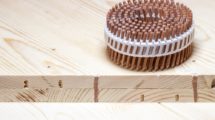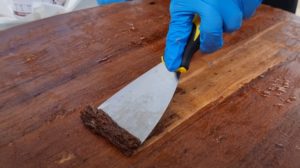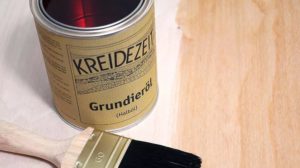The interest in finishing furniture with wax is very high and the questions received on this subject are very diverse. I've tried to make a selection of the most frequently asked questions, but I'm sure there are others that I haven't yet received or thought of. If you have such a question that is not answered below or in article on wax finishing, you can leave it in the comments box. I promise to reply and complete the article to find as many answers as possible in one place. And now for the answers.

1. Can I apply wax over varnish?
Yes. Wax can be applied over almost any varnish, paint or oil. But it is a good idea to test compatibility on a more hidden area first. Modern synthetic waxes contain solvents that could attack the varnish coating. This happens very rarely, but it's better not to risk it. Wax is applied over the varnish to protect it and add a nice, silky sheen. On heavily used surfaces, such as wood floors, the wax coating prolongs the life of the varnish and prevents scratching.
2. Does the old coating need to be removed before applying the new one?
This is not obligatory, it depends on the situation. If it is an old piece of furniture that is soiled and dirty, then the wax layer must be removed (how to do this is described below). The wax is thoroughly cleaned and then a new coat is applied. If, however, it is a refresh of the wax coat because it has thinned or lost its sheen, the wax can be applied over the old coat without any further preparation. To give it a shine, polish it with a soft cotton cloth or a piece of felt after application.
3. Can be applied oil over wax?
No. Only wax can be applied over wax. Wax is the top coat, and any other finishing product will not adhere to the wax coat.
4. What are the advantages of wax finishing?
⊕ It is a very good solution for refreshing old furniture. By applying a coat of wax over the varnish, which is then polished, the furniture acquires a pleasant touch and a beautiful natural sheen.
⊕ It can repair any small scratch or imperfection on your furniture. It's the easiest way to keep your furniture in good condition.
⊕ Gives a matt furniture a gloss. To change the very matt appearance of the furniture, 2-3 successive coats of wax can be applied with drying in between. After drying (minimum 24 hours after the last coat), polishing can be done. If using polishing machines and felt disks of different fineness, a gloss level of 60-70 can be achieved.
5. Can be antiqued the requested furniture?
Yes, with colored skies. The choice of shade or color is made so that the effect is as believable and natural as possible. This wax effect looks great on opaque finished furniture in various colors. The wax is applied as usual with a cloth, after which the excess is wiped off and polished. In hard-to-reach places, more wax will remain, giving a patina effect.
6. in what situations is wax finishing not recommended?
When the varnish film on furniture must have very good resistance to dry and wet hot sources and stains (with water, alcohol, coffee, etc). This is the case for bar, kitchen or dining table tops, furniture susceptible to cleaning with aggressive alcohol-based substances, furniture on which hot objects are placed. All these factors lead to the wax softening, even dissolving, and, last but not least, to its removal from the furniture. For such furniture, chemically hardened varnishes with very good resistance are recommended.
Another recommendation is not to apply wax over waterborne finishes. There is a risk that the solvents in the mixture may irreparably attack the varnish layer. However, this is not the case for any waterborne finish, so it is a good idea to test for compatibility.

7. How can the wax be removed? How do we know it has been removed?
No other type of finish (except wax) can be applied over wax because it has no adhesion. Wax should therefore be removed when changing the type of finish or when dirty and soiled furniture needs to be completely redone.
If only the surface layer is to be removed, it is sand very well and then wipe the surface thoroughly with thinner. The sanding is done until the varnish layer under the wax is reached. If any traces of wax remain, the varnish will 'slide' on them and craters will appear in the film, called "fish eyes".
If wood has to be reached, sanding should be done with more aggressive equipment. The removal of the finish coat is checked by wiping the surface of the wood with a damp cloth. If the wood absorbs water and darkens, the finish has been completely removed. If water remains on the surface, sanding should be continued.
As I said at the beginning, if you have any other questions please leave them below. And if the article seems interesting to others, feel free to share. Thank you!




































Good evening! I would like to know if I can apply a layer of wax over a portion of the chest of drawers, which is slightly scratched, to cover them? Please note that the furniture is a dark shade (wenge), does not have a glossy but matte texture and is very, very finished. If the report is positive, please tell me if the wax will give the surface a more glossy appearance than before and how to apply the wax, with a brush or spray gun? Thanks in advance!
Good evening!
Wax can be applied. Wax is applied with a rag and is matte when applied. To get the shine it should be polished with a soft cotton cloth.
It is best to use waxed retouching sticks in a beige colour. They can be found in DIY or wood products shops. They will cover the scratch without affecting the rest of the surface.
Some simple solutions for fixing scratches can be found in the link below.
All the best!
https://revistadinlemn.ro/2017/05/17/cum-pot-fi-reparate-zgarieturile-de-pe-mobila/
Good evening! Please tell me if it is recommended to apply colorless wax on furniture painted with white water-based paint. It looks very good just painted, but it is very sensitive to any slightly "aggressive" touch. Thanks!
Hello!
Yes, wax can be applied. If it is chalky paint (Annie Sloan type - see link below) it is mandatory to fix it with wax or varnish because otherwise it is not resistant - it scratches, it takes easily, it does not resist well to water and cleaning materials etc.
If the paint "jumps" easily when hit and under it remains clean (with no trace or very few traces of white paint) the old layer on which it was applied, it means that it has no adhesion and the wax will improve a little, but not much.
All the best!
https://revistadinlemn.ro/2018/03/12/ceara-annie-sloan-protejare-patinare-tehnici-de-aplicare/
Thank you very much!